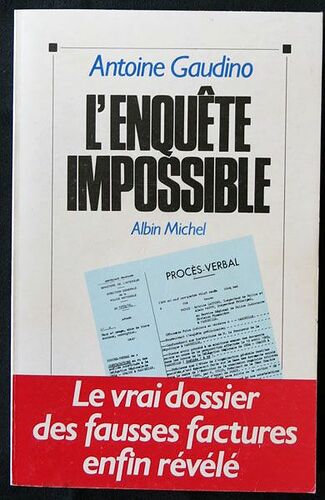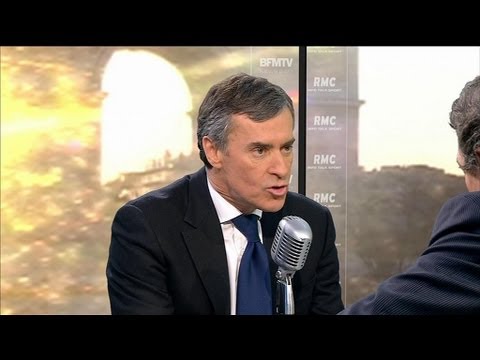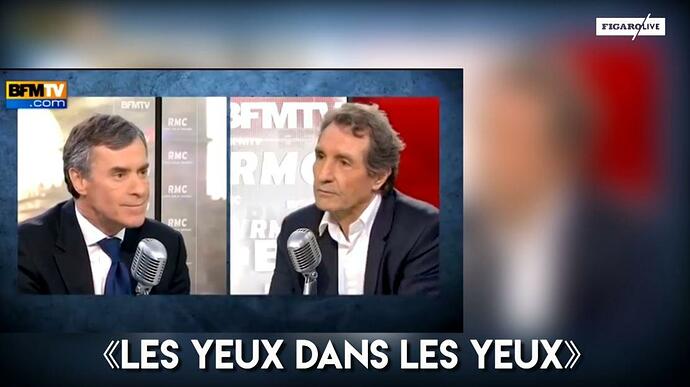I’ve actually written on here, in this April post in particular, about the Elf scandal and also, to a lesser extent, about the Urba scandal. Elf was much bigger but it was Urba that triggered it all, as it happened about 5 years before.
The nuts and bolts of the Urba scandal, in a nutshell…
in 1971 the nascent Parti Socialiste, created on the ashes of Jean Jaurès’s SFIO and recently taken over by François Mitterrand who set about resurrecting it through uniting all the leftwing parties (the so-called “Programme Commun”), set up a company called Urba, whose initial job was to collect funds to finance this fledgling Parti Socialiste.
However, Urba soon decided to go beyond just collecting and managing money. It needed serious dosh to create a war machine to oppose the Right so it “branched out” to do “consultancy” work, vetting tenders, choosing architects & project managers etc. This was perfectly legal as there was no laws then pertaining to financing political parties (leaving the latter to find “imaginative” way to raise funds, seeing that membership fees were never be enough to finance the PS). But while the premise was above board, the Urba methods soon become seriously illegal.
Before long, Urba was mimicking the mafia: they racketeered companies in exchange for public contracts in local authorities & communes controlled by the Parti Socialiste and/or affiliated.
Urba would take about about 5% of the total cost and the money was shared out roughly equally between Urba (mainly to cover the running costs), the Parti Socialiste and the bent local politicians of all stripes – mayors, councillors etc. – who’d procured the contracts (so, certainly not necessarily all Socialists), with company directors being occasionally arrosés too (slang for greasing s.o’s palm).
In order to appear legit and complexify things should investigators or the taxman poke their noses, those companies sent real invoices for bogus work to third-party companies or subcontractors, in other words they’d created a classic double or treble accountancy system. Local Urba offices were also set up feeding a host of sociétés bidons (bogus companies) to funnel that money to the Parti Socialiste via circuitous ways.
It was a well-oiled system which thrived for 17 years, until the Marseille financial police (see this potted history of the saga) discovered paperwork at the local Urba offices establishing illegal funding of the Parti Socialiste. Then little by little, insiders started to talk and explain how the fraudulent operation worked.
That money financed the Parti Socialiste and its electoral campaigns up to 1989 but a number of the politicians involved in the scam were rightwing local officials too. Anyone who fancied being on the take could be involved, regardless of their political persuasion. Involving politicians and elected officials of all hues also ensured a sort of omertà across the board. This particular involvement of rightwing politicians and other local ramifications, when initially it was thought that only the PS benefited from that system, were uncovered in particular by the financial police officer & lawyer and general whistleblower Antoine Gaudino who has written extensively on this case, books and so on.
As Gaudino wrote (see this), there was a “consensus total entre la droite et la gauche pour que la corruption s’organise selon les vœux de chacun avec la méthode qui était déjà établie. La Droite savait quelle était la méthode de la Gauche et vice-versa”.
There were also lesser scandals in the 2000s and even recently, it’s an on-going process, eg under Sarkozy of course – I mean, where to start with him… But the Teflonic bastard is an expert in covering his tracks and/or making sure minions take the rap (Le Monde 4 months ago published a welcome recap on his on-going legal marathon and the 12 prosecutions agst him: Le point sur les douze affaires affaires de N. Sarkozy). Well, except for the “Sarkozy aka Paul Bismuth” case that is, recently brought before the courts (BBC article), it’s gone to the Appeal Court on Sarko’s lawyers’ request.
And more recently under Hollande, the Affaire Cahuzac under François Hollande (first uncovered by Mediapart) springs to mind as it marked a turning point too.
Thanks to the bent Jérôme Cahuzac, the Hollande gvt set up an anti-corruption agency (the HATVP I wrote about in my previous post) and a national office to prosecute financial crimes, the Parquet national financier. Cahuzac, who before entering the first (Ayrault) government under François Hollande, was député-maire of Villeneuve-sur-Lot in Dpt 47 where he’s from (regionally speaking) and where he made his political name (a pariah since the scandal, he now lives as a relative recluse in Corsica. Aged 69 today, he recently managed to get some part-time work as a doctor at the Bonifacio hospital while wearing an electronic tag, the Ordre des Médecins having eventually reinstalled him).
The wealthy cosmetic & hair transplant surgeon-turned-politician Jérôme Cahuzac is one of the biggest barefaced liars in recent French politics and has become a byword for egregious political “do as I say but not as I do” cynical hypocrisy.
Appointed by François Hollande as Budget minister in 2012 with a strong brief to tackle tax evasion via “redressement fiscal” so much so that prior to his downfall he was nicknamed “the Fiscal Tsar” or similar, Cahuzac repeatedly (for 4 months) lied in front of parliament, the media, various commissions etc., about undeclared bank accounts he’d had for 20 yrs in Switzerland and Singapore containing millions of €. His infamous cynical riposte (« C’est moi qui dis la vérité. Les yeux dans les yeux, je vous le dis : je n’ai pas, je n’ai jamais eu de compte en Suisse, à aucun moment. ») to the RMC pitbull-type interviewer Jean-Jacques Bourdin on BFMTV is held as the gold standard in hypocrisy:
Although you could argue that Cahuzac was more about transparency and one rotten apple as it were than systemic corruption linked to political party funding like we saw in the late 1980s and 1990s, but in the general public’s “tous pourris” mind these things are generally conflated).
The Urba and Elf scandals revealed and/or dealt with by investigative media, courageous whistleblowers, pugnacious financial police CID investigators and no-nonsense “juges d’instruction” (investigating/examining judges) who, in France, are more like detectives with a lot of power (some of these CID people and judges, who as you can imagine had to fight against a cloak of secrecy and in general agst a whole corrupt system who accused them of being part of anti-governmental conspiracy so it was tough for them, especially as the first big scandal, Urba, was directed against the Socialists who were in charge then – I can still visualise François Mitterrand’s faux outrage on TV when the HQs of the Socialist Party were searched in January 1992, see this Le Monde archives article – some of them became famous and bywords for anti-corruption and incorruptibility, such as Renaud Van Ruymbecke and Eva Joly who are household names in France after lengthy and difficult investigations on the main “affaires”, i.e the Affaire Urba and the Affaire Elf.).
The problem before these laws & measures were implemented is that there was no legislation whatsoever so it was a free-for-all, for all parties, they were all at it as there were no rules. Compliance of the judiciary authorities (“le Législatif”) towards the “Exécutif” (the politicians in charge) was a real problem too, so even when a scandal was revealed and successfully investigated not much happened. This combo of an absence of clear specific rules and the of influential politicians on justice ensured that bent politicians got off scot-free.
The protracted Elf scandal was the more spectacular and high-profile as it had it all (wide-ranging corruption, famous politicians & companies involved, improbable characters, sex, juicy details, ridiculously lavish lifestyles, staggering sums involved, international ramifications in Asia, Germany etc. – the CDU of Helmut Kohl may have been on the take, see this – , trials a-plenty, counter trials etc.) but the Urba scandal is the seminal and pivotal one really, the one that set root-and-branch changes in motion, changes at all levels, which gradually spawned the following – non exhaustive list –: creation of a specific legislation, real powers given to the judiciary, setting up of organisations to audit and check transparency in politics & parties’ accounts, strict regulation around the financing of political parties & electoral campaigns etc. as summarised here in this France Inter summary of a radio programme on the Urba saga:
[Urba et orbi : Le financement occulte du Parti Socialiste
[…]
Oui, il y a bien financement occulte du parti socialiste, mais voilà, tous les autres partis font la même chose, parce qu’ils n’ont pas le choix. […] Il faudra l’abnégation de la presse, de certains enquêteurs et de plusieurs juges d’instructions pour qu’éclate le scandale Urba et que soit mise en lumière le système trouble du financement des partis politiques. Une affaire Urba qui est aussi celle des grandes premières : elle provoque le vote de deux lois, une d’amnistie et une autre sur le financement des partis politiques. Et pour la première fois, un parti politique est condamné pour financement occulte, et un Président de l’Assemblée Nationale jugé pour ces faits](Urba et orbi Le financement occulte du Parti Socialiste).
For further reading on the funding of political parties in France, see this informative article from the vie-publique.fr site: https://www.vie-publique.fr/fiches/24004-comment-les-partis-politiques-sont-ils-finances


